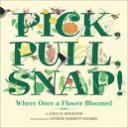
There are many tiny city farms scattered across London where urban school children can experience farming up-close. The children can pet sheep, feed goats, see how fruits and vegetables are grown, and, if they are lucky, harvest some of the produce. If we had city farms here, the book I would read to my future students before a field trip is Pick, Pull, Snap!: Where Once a Flower Bloomed by Lola M. Schaefer. What do peaches, raspberries, peas, corn, peanuts and pumpkins have in common? They all begin with a flower. Lindsay Barrett George’s lifelike paintings take centerstage as they illustrate a flower being pollinated; the developing fruit; and finally, after you fold-out the page, a child picking, pulling, or snapping the ripe fruit.
Curriculum Connections
It’s the detailed pictures–a bloom left on the end of a peapod, a cross-section showing seeds in fruit, a cut-away showing a tangle of peanuts underground–that make Pick, Pull, Snap! a great tie-in to any elementary grade-level life science unit on plants. (VA SOL 1.4, 2.4b and 4.4a & b).
Additional Resources
- What better way to teach about plants than to grow them in your classroom? What Plants Need to Grow will give you all the details, including lessons plans, reproducibles and answers to FAQ’s.
- If your classroom conditions aren’t right for growing, consider the other end of the plant life cycle–composting. Composting for Kids, a Powerpoint with photos of children doing the work, shows just how easy composting is.
- Pick, Pull, Snap! takes you from seed to fruit. Now go from Fruit to Seed with this classroom activity that ends with a delicious, healthy snack.
Book: Pick, Pull, Snap!: Where Once a Flower Bloomed
Author: Lola M. Schaeffer
Illustrator: Lindsay Barrett George
Publisher: Harper Collins Publisher
Publication Date: March 2003
Pages: 32
Grade Range: K – 5
ISBN-13: 9780688178345
